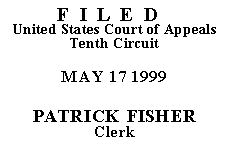

| ABDUL AZIZ, | No. 98-1466
(D.C. No. 97-B-1748) |
After unsuccessfully applying for an advertised opening on the faculty of the University's Mechanical Engineering Department, Aziz filed suit alleging that the University denied him the position in violation of Title VII and the ADEA. The parties entered a conditional settlement agreement before a magistrate judge in which they agreed that the court would appoint a qualified expert witness to determine whether Aziz or the person to whom the position was given ("the selectee") was better qualified. If the expert concluded that the selectee was better qualified, Aziz agreed to withdraw his case with prejudice and pay the expert's fee. If, on the other hand, the expert concluded that Aziz was better qualified, the case would proceed to trial, and the University would pay the expert's fee.
The district court appointed Albert Rosa, Ph.D., as special master. At the time of his appointment, Dr. Rosa was a professor and chair of the Engineering Department at the University of Denver. Aziz challenged Dr. Rosa's qualifications and objected to the appointment. The magistrate entered an order concluding that Dr. Rosa was qualified to serve as special master, and that he should carry out his duties unless the parties informed the court in writing that they did not intend to comply with the terms of the settlement agreement.
Aziz thereupon agreed in writing to comply with the agreement.(1) After Dr. Rosa informed the court of his conclusion that the selectee was better qualified for the position, the University moved to dismiss the complaint with prejudice under the terms of the conditional settlement agreement. Aziz objected, arguing, inter alia, that Dr. Rosa was not qualified because he did not follow the court order, made factual mistakes, and came to an incorrect conclusion. Concluding that Aziz had previously waived his objections to the appointment of Dr. Rosa, the court dismissed his complaint with prejudice.
Aziz argues to us that the court's appointment of a special master violated the terms of the settlement agreement. He also contends that the court erred when it concluded that Dr. Rosa complied with its order and reviewed only the job advertisement and the paperwork submitted by the two candidates to the search committee. We are not persuaded that the appointment of Dr. Rosa as a special master rather than as an expert witness violated the agreement. The threshold issue before us, however, is whether Aziz waived his right to challenge the appointment.
A settlement agreement is a contract bestowing certain rights on the parties. See Anthony v. United States, 987 F.2d 670, 673 (10th Cir. 1993). Those rights, however, can be voluntarily waived. See Southern Colorado MRI, Ltd. v. Med-Alliance, Inc., 166 F.3d 1094, 1098 (10th Cir. 1999). Upon review of the record, we conclude that to the extent Aziz had a right to object to Dr. Rosa's appointment, he waived that right by his written commitment to comply with the settlement agreement. Aziz is thus precluded from asserting a right to object. See, e.g., Constant v. Advanced Micro-Devices, Inc., 848 F.2d 1560, 1566 (Fed. Cir. 1988).(2)
We also conclude there is no merit to Aziz's argument that the court erred when it found that Dr. Rosa complied with its order and reviewed only the job advertisement and paper work submitted by the candidates to the search committee. The court order required Dr. Rosa to reach his decision based upon the job as advertised or the document listing the qualification for the job, as well as the paperwork submitted to the search committee. Other than inviting us to engage in mere speculation, Aziz presents no evidentiary support for his argument that Dr. Rosa violated the court order.
AFFIRMED. The mandate shall issue forthwith.
ENTERED FOR THE COURT
Carlos F. Lucero
Circuit Judge
*.The case is unanimously ordered submitted without oral argument pursuant to Fed. R. App. P. 34(a)(2) and 10th Cir. R. 34.1(G). This order and judgment is not binding precedent, except under the doctrines of law of the case, res judicata, and collateral estoppel. The court generally disfavors the citation of orders and judgments; nevertheless, an order and judgment may be cited under the terms and conditions of 10th Cir. R. 36.3.
1. Aziz subsequently filed a Notice of Appeal, without indicating the order from which he appealed. On July 1, 1998, this court dismissed the appeal on Aziz's motion. We conclude that the Notice of Appeal does not refute Aziz's clear expression of intent to comply with the settlement agreement.
2.In fact, we are unpersuaded by the merits of Aziz's challenge to Dr. Rosa's qualifications.